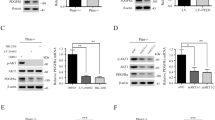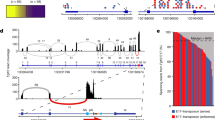Abstract
Recently, germline and somatic heterozygous mutations in the platelet-derived growth factor receptor β (PDGFRB) have been associated with familial infantile myofibromatosis (IM), which is characterized by soft tissue tumors, and overgrowth syndrome, a disease that predisposes to cancer. These mutations have not been functionally characterized. In the present study, the activity of three PDGFRB mutants associated with familial IM (R561C, P660T and N666K) and one PDGFRB mutant found in patients with overgrowth syndrome (P584R) was tested in various models. The P660T mutant showed no difference with the wild-type receptor, suggesting that it might represent a polymorphic variant unrelated to the disease. By contrast, the three other mutants were constitutively active and able to transform NIH3T3 and Ba/F3 cells to different extents. In particular, the germline mutant identified in overgrowth syndrome, P584R, was a stronger oncogene than the germline R561C mutant associated with myofibromatosis. The distinct phenotypes associated with these two mutations could be related to this difference of potency. Importantly, all activated mutants were sensitive to tyrosine kinase inhibitors such as imatinib, nilotinib and ponatinib. In conclusion, the PDGFRB mutations previously identified in familial IM and overgrowth syndrome activate the receptor in the absence of ligand, supporting the hypothesis that these mutations cause the diseases. Moreover, imatinib seems to be a promising treatment for patients carrying these mutations. To our knowledge, these are the first confirmed gain-of-function point mutations of PDGFRB in human cancer.
This is a preview of subscription content, access via your institution
Access options
Subscribe to this journal
Receive 50 print issues and online access
$259.00 per year
only $5.18 per issue
Buy this article
- Purchase on Springer Link
- Instant access to full article PDF
Prices may be subject to local taxes which are calculated during checkout







Similar content being viewed by others
References
Zand DJ, Huff D, Everman D, Russell K, Saitta S, McDonald-McGinn D et al. Autosomal dominant inheritance of infantile myofibromatosis. Am J Med Genet A 2004; 126A: 261–266.
Mashiah J, Hadj-Rabia S, Dompmartin A, Harroche A, Laloum-Grynberg E, Wolter M et al. Infantile myofibromatosis: a series of 28 cases. J Am Acad Dermatol 2014; 71: 264–270.
Wiswell TE, Sakas EL, Stephenson SR, Lesica JJ, Reddoch SR . Infantile myofibromatosis. Pediatrics 1985; 76: 981–984.
Miklossy J, Mackenzie IR, Dorovini-Zis K, Calne DB, Wszolek ZK, Klegeris et al. Severe vascular disturbance in a case of familial brain calcinosis. Acta Neuropathol 2005; 109: 643–653.
Ang P, Tay YK, Walford NQ . Infantile myofibromatosis: a case report and review of the literature. Cutis 2004; 73: 229–231.
Chung EB, Enzinger FM . Infantile myofibromatosis. Cancer 1981; 48: 1807–1818.
Bracko M, Cindro L, Golouh R . Familial occurrence of infantile myofibromatosis. Cancer 1992; 69: 1294–1299.
Martignetti JA, Tian L, Li D, Ramirez MC, Camacho-Vanegas O, Camacho SC et al. Mutations in PDGFRB cause autosomal-dominant infantile myofibromatosis. Am J Hum Genet 2013; 92: 1001–1007.
Cheung YH, Gayden T, Campeau PM, Leduc CA, Russo D, Nguyen VH et al. A recurrent PDGFRB mutation causes familial infantile myofibromatosis. Am J Hum Genet 2013; 92: 996–1000.
Demoulin JB, Essaghir A . PDGF receptor signaling networks in normal and cancer cells. Cytokine Growth Factor Rev 2014; 25: 273–283.
Andrae J, Gallini R, Betsholtz C . Role of platelet-derived growth factors in physiology and medicine. Genes Dev 2008; 22: 1276–1312.
Soriano P . The PDGF alpha receptor is required for neural crest cell development and for normal patterning of the somites. Development 1997; 124: 2691–2700.
Soriano P . Abnormal kidney development and hematological disorders in PDGF beta-receptor mutant mice. Genes Dev 1994; 8: 1888–1896.
Verstraete K, Savvides SN . Extracellular assembly and activation principles of oncogenic class III receptor tyrosine kinases. Nat Rev Cancer 2012; 12: 753–766.
Chiara F, Bishayee S, Heldin CH, Demoulin JB . Autoinhibition of the platelet-derived growth factor beta-receptor tyrosine kinase by its C-terminal tail. J Biol Chem 2004; 279: 19732–19738.
Toffalini F, Demoulin JB . New insights into the mechanisms of hematopoietic cell transformation by activated receptor tyrosine kinases. Blood 2010; 116: 2429–2437.
Heldin CH, Ostman A, Ronnstrand L . Signal transduction via platelet-derived growth factor receptors. Biochim Biophys Acta 1998; 1378: F79–F113.
Lacerda Lda S, Alves UD, Zanier JF, Machado DC, Camilo GB, Lopes AJ . Differential diagnoses of overgrowth syndromes: the most important clinical and radiological disease manifestations. Radiol Res Pract 2014; 2014: 947451.
Takenouchi T, Yamaguchi Y, Tanikawa A, Kosaki R, Okano H, Kosaki K . Novel Overgrowth Syndrome Phenotype Due to Recurrent De Novo PDGFRB Mutation. J Pediatr 2015; 166: 483–486.
Heldin CH . Targeting the PDGF signaling pathway in tumor treatment. Cell Commun Signal 2013; 11: 97.
Chiara F, Goumans MJ, Forsberg H, Ahgren A, Rasola A, Aspenstrom P et al. A gain of function mutation in the activation loop of platelet-derived growth factor beta-receptor deregulates its kinase activity. J Biol Chem 2004; 279: 42516–42527.
Medves S, Duhoux FP, Ferrant A, Toffalini F, Ameye G, Libouton JM et al. KANK1, a candidate tumor suppressor gene, is fused to PDGFRB in an imatinib-responsive myeloid neoplasm with severe thrombocythemia. Leukemia 2010; 24: 1052–1055.
Cools J, DeAngelo DJ, Gotlib J, Stover EH, Legare RD, Cortes J et al. A tyrosine kinase created by fusion of the PDGFRA and FIP1L1 genes as a therapeutic target of imatinib in idiopathic hypereosinophilic syndrome. N Engl J Med 2003; 348: 1201–1214.
Nicolas G, Pottier C, Maltete D, Coutant S, Rovelet-Lecrux A, Legallic S et al. Mutation of the PDGFRB gene as a cause of idiopathic basal ganglia calcification. Neurology 2013; 80: 181–187.
Nicolas G, Pottier C, Charbonnier C, Guyant-Marechal L, Le Ber I, Pariente J et al. Phenotypic spectrum of probable and genetically-confirmed idiopathic basal ganglia calcification. Brain 2013; 136: 3395–3407.
Arts FA, Velghe AI, Stevens M, Renauld JC, Essaghir A, Demoulin JB . Idiopathic basal ganglia calcification-associated PDGFRB mutations impair the receptor signalling. J Cell Mol Med 2015; 19: 239–248.
Schonherr C, Ruuth K, Yamazaki Y, Eriksson T, Christensen J, Palmer RH et al. Activating ALK mutations found in neuroblastoma are inhibited by Crizotinib and NVP-TAE684. Biochem J 2011; 440: 405–413.
Nakahara M, Isozaki K, Hirota S, Miyagawa J, Hase-Sawada N, Taniguchi M et al. A novel gain-of-function mutation of c-kit gene in gastrointestinal stromal tumors. Gastroenterology 1998; 115: 1090–1095.
Heinrich MC, Corless CL, Duensing A, McGreevey L, Chen CJ, Joseph N et al. PDGFRA activating mutations in gastrointestinal stromal tumors. Science 2003; 299: 708–710.
Looman C, Sun T, Yu Y, Zieba A, Ahgren A, Feinstein R et al. An activating mutation in the PDGF receptor-beta causes abnormal morphology in the mouse placenta. Int J Dev Biol 2007; 51: 361–370.
Keating MT, Harryman CC, Williams LT . Platelet-derived growth factor receptor inducibility is acquired immediately after translation and does not require glycosylation. J Biol Chem 1989; 264: 9129–9132.
Demoulin JB, Uyttenhove C, Lejeune D, Mui A, Groner B, Renauld JC . STAT5 activation is required for interleukin-9-dependent growth and transformation of lymphoid cells. Cancer Res 2000; 60: 3971–3977.
Velghe AI, Van Cauwenberghe S, Polyansky AA, Chand D, Montano-Almendras CP, Charni S et al. PDGFRA alterations in cancer: characterization of a gain-of-function V536E transmembrane mutant as well as loss-of-function and passenger mutations. Oncogene 2014; 33: 2568–2576.
Corless CL, Schroeder A, Griffith D, Town A, McGreevey L, Harrell P et al. PDGFRA mutations in gastrointestinal stromal tumors: frequency, spectrum and in vitro sensitivity to imatinib. J Clin Oncol 2005; 23: 5357–5364.
David M, Cross NC, Burgstaller S, Chase A, Curtis C, Dang R et al. Durable responses to imatinib in patients with PDGFRB fusion gene-positive and BCR-ABL-negative chronic myeloproliferative disorders. Blood 2007; 109: 61–64.
Li-Wan-Po A, Farndon P, Craddock C, Griffiths M . Integrating pharmacogenetics and therapeutic drug monitoring: optimal dosing of imatinib as a case-example. Eur J Clin Pharmacol 2010; 66: 369–374.
Linhares ND, Freire MC, Cardenas RG, Bahia M, Puzenat E, Aubin F et al. Modulation of expressivity in PDGFRB-related infantile myofibromatosis: a role for PTPRG? Genet Mol Res 2014; 13: 6287–6292.
Barker KT, Houlston RS . Overgrowth syndromes: is dysfunctional PI3-kinase signalling a unifying mechanism? Eur J Hum Genet 2003; 11: 665–670.
Lindhurst MJ, Sapp JC, Teer JK, Johnston JJ, Finn EM, Peters K et al. A mosaic activating mutation in AKT1 associated with the Proteus syndrome. N Engl J Med 2011; 365: 611–619.
Millot F, Guilhot J, Baruchel A, Petit A, Leblanc T, Bertrand Y et al. Growth deceleration in children treated with imatinib for chronic myeloid leukaemia. Eur J Cancer 2014; 50: 3206–3211.
Demoulin JB, Louahed J, Dumoutier L, Stevens M, Renauld JC . MAP kinase activation by interleukin-9 in lymphoid and mast cell lines. Oncogene 2003; 22: 1763–1770.
Noel LA, Arts FA, Montano-Almendras CP, Cox L, Gielen O, Toffalini F et al. The tyrosine phosphatase SHP2 is required for cell transformation by the receptor tyrosine kinase mutants FIP1L1-PDGFRalpha and PDGFRalpha D842V. Mol Oncol 2014; 8: 728–740.
Medves S, Noel LA, Montano-Almendras CP, Albu RI, Schoemans H, Constantinescu SN et al. Multiple oligomerization domains of KANK1-PDGFRbeta are required for JAK2-independent hematopoietic cell proliferation and signaling via STAT5 and ERK. Haematologica 2011; 96: 1406–1414.
Acknowledgements
We would like to thank Nicolas Dauguet for cell sorting, and Anabelle Decottignies, Guy Warnier and Laure Dumoutier for generous donation of reagents. We are grateful to Ahmed Essaghir for statistical analysis. FAA is the recipient of a fellowship from FRS-FNRS – Télévie (grant number 7.4501.13 F).
Author information
Authors and Affiliations
Corresponding author
Ethics declarations
Competing interests
The authors declare no conflict of interest.
Additional information
Supplementary Information accompanies this paper on the Oncogene website
Rights and permissions
About this article
Cite this article
Arts, F., Chand, D., Pecquet, C. et al. PDGFRB mutants found in patients with familial infantile myofibromatosis or overgrowth syndrome are oncogenic and sensitive to imatinib. Oncogene 35, 3239–3248 (2016). https://doi.org/10.1038/onc.2015.383
Received:
Revised:
Accepted:
Published:
Issue Date:
DOI: https://doi.org/10.1038/onc.2015.383
This article is cited by
-
PDGFRA K385 mutants in myxoid glioneuronal tumors promote receptor dimerization and oncogenic signaling
Scientific Reports (2024)
-
Prenatal genetic diagnosis of disseminated infantile myofibromatosis: a case report and literature review
BMC Medical Genomics (2023)
-
Giant intracranial infantile myofibromatosis of the skull base: report of two cases
Child's Nervous System (2022)
-
Aggressive infantile myofibromatosis with intestinal involvement
Molecular and Cellular Pediatrics (2021)
-
Significant Antitumor Activity of Pazopanib in a Patient with PDGFRB-Mutated Metastatic Phyllodes Tumor: a Case Report
SN Comprehensive Clinical Medicine (2021)



